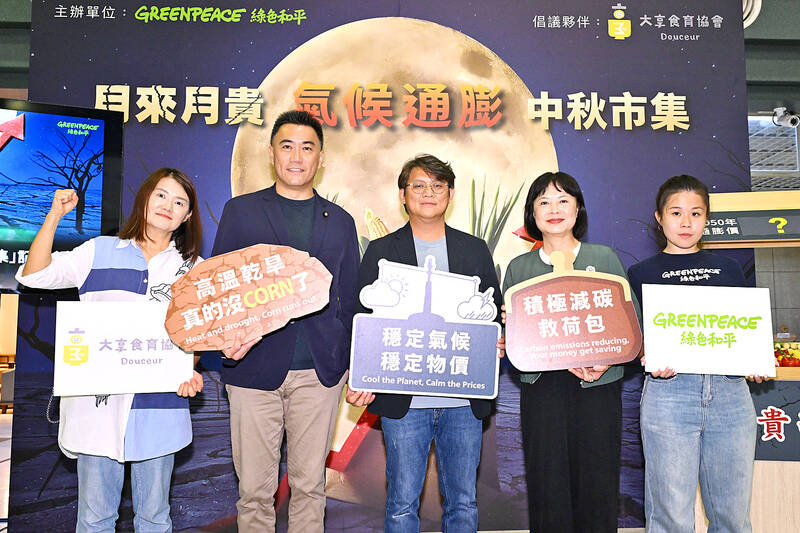Greenpeace yesterday urged the Cabinet’s National Climate Change Committee to discuss strategies for addressing “climate inflation.”
Greenpeace East Asia climate and energy campaigner Lydia Fang (方君維) told a news conference in Taipei that climate change seriously affects the world economy, while “climate inflation” impacts are increasing yearly.
Greenpeace’s survey showed that the cost of food ingredients sold during the Mid-Autumn Festival has increased by nearly 40 percent in the past decade, Fang said.

Photo: Chen Yi-kuan, Taipei Times
The government should acknowledge that solving climate change can slow down inflation, she said, urging President William Lai’s (賴清德) National Climate Change Committee to make “climate inflation” a priority agenda in developing climate strategies.
Short-term strategies should include “climate change compensation” to help people cope with economic losses and damage from natural disasters caused by climate change, which would help reduce the effects on more vulnerable groups, such as children, older people and low-income households, Fang said.
The mid to long-term strategies should include a “net zero investment bill” to fund the purchase of renewable energy power generation equipment by individuals or companies, she said.
The UN Committee on the Rights of the Child’s General Comment No. 26, passed last year, has a special focus on climate change, recognizing that children have a right to a clean, healthy and sustainable environment, Democratic Progressive Party Legislator Lin Yue-chin (林月琴) told the news conference.
The document also states that governments must take all necessary, appropriate and reasonable measures to protect against climate change-related harms to children’s rights that are caused or perpetuated by businesses, and to ensure that corporations rapidly reduce their emissions, she said.
Lin said she would ask the Ministry of Economic Affairs and the Directorate-General of Budget, Accounting and Statistics to consider those issues when formulating policies, so that the next generation does not face unlivable conditions and a rapidly growing gap between the rich and the poor due to climate change.
Chinese Nationalist Party (KMT) Legislator Huang Chien-pin (黃建賓) said that climate change has had a serious effect on agriculture in Taitung County, limiting output and the stability of prices.
“We indeed need to think carefully about what kind of environment we want to leave for our next generations,” he said.
KMT Legislator Jonathan Lin (林沛祥) said that a phrase he heard during an international conference he attended last year had stuck with him: “Climate change and global warming would not destroy the world, but would cause human extinction.”
Climate change not only causes rising sea levels, but also practical food issues, he said, adding that usually crabs can be harvested in Keelung or along the northern coast around the Mid-Autumn Festival, but now they can only be found after October, and the harvest amount and quality have fallen.
“Net zero emissions is the only path forward, and going against nature would only harm humans,” he said.

Beijing could eventually see a full amphibious invasion of Taiwan as the only "prudent" way to bring about unification, the US Department of Defense said in a newly released annual report to Congress. The Pentagon's "Annual Report to Congress: Military and Security Developments Involving the People's Republic of China 2025," was in many ways similar to last year’s report but reorganized the analysis of the options China has to take over Taiwan. Generally, according to the report, Chinese leaders view the People's Liberation Army's (PLA) capabilities for a Taiwan campaign as improving, but they remain uncertain about its readiness to successfully seize

Taiwan is getting a day off on Christmas for the first time in 25 years. The change comes after opposition parties passed a law earlier this year to add or restore five public holidays, including Constitution Day, which falls on today, Dec. 25. The day marks the 1947 adoption of the constitution of the Republic of China, as the government in Taipei is formally known. Back then the Chinese Nationalist Party (KMT) governed China from Nanjing. When the KMT, now an opposition party in Taiwan, passed the legislation on holidays, it said that they would help “commemorate the history of national development.” That

Taiwan has overtaken South Korea this year in per capita income for the first time in 23 years, IMF data showed. Per capita income is a nation’s GDP divided by the total population, used to compare average wealth levels across countries. Taiwan also beat Japan this year on per capita income, after surpassing it for the first time last year, US magazine Newsweek reported yesterday. Across Asia, Taiwan ranked fourth for per capita income at US$37,827 this year due to sustained economic growth, the report said. In the top three spots were Singapore, Macau and Hong Kong, it said. South

Snow fell on Yushan (Jade Mountain, 玉山) yesterday morning as a continental cold air mass sent temperatures below freezing on Taiwan’s tallest peak, the Central Weather Administration (CWA) said. Snowflakes were seen on Yushan’s north peak from 6:28am to 6:38am, but they did not fully cover the ground and no accumulation was recorded, the CWA said. As of 7:42am, the lowest temperature recorded across Taiwan was minus-5.5°C at Yushan’s Fengkou observatory and minus-4.7°C at the Yushan observatory, CWA data showed. On Hehuanshan (合歡山) in Nantou County, a low of 1.3°C was recorded at 6:39pm, when ice pellets fell at Songsyue Lodge (松雪樓), a